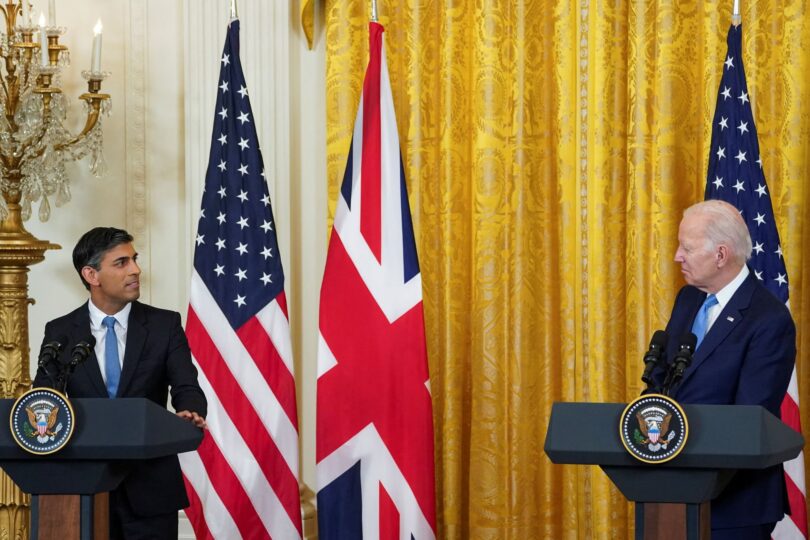Fred De Fossard
The British government is on the cusp of agreeing a free trade agreement with India, in a deal which is expected to expand markets for high value British exports, particularly cars and whisky, and facilitate greater trade and mobility between the two countries. Unresolved sticking points around immigration remain. The Prime Minister was correct to say that immigration should be considered separately to any trade deal, given that Indians are already awarded the largest number of visas by the Home Office of any country in the world, at a time of record immigration to the UK. Continued mass immigration, from India or any other country, will harm, not help, growth.
Nevertheless, a deal looks to be coming, and it will mark a significant development in the so-called ‘Indo-Pacific Tilt’ which the British government embarked upon after Brexit: this has included the Integrated Review of defence policy, the Aukus nuclear submarine pact, and trade agreements with Australia, New Zealand, and the Pacific Rim nations. Conspicuous in its absence in all this ambition, however, is a trade deal with the world’s preeminent economy, and Britain’s largest trading partner, the United States of America.
Signing a free trade agreement with the United States was long considered a prize that Brexit might bring. After talks between the US and the European Union on their own deal stalled, many hoped that Britain and America would agree a trade deal in record time, taking advantage of the simultaneous Conservative Government in Westminster and Republican Administration in the White House. It hasn’t happened. Despite overwhelming public support at the time for such a deal, the British political class’ distaste for President Trump and protectionist arguments against American food imports meant that talks fizzled out. Since the election of President Biden and a political shift in the US against trade liberalisation, it seemed like the idea was dead for good, or at least another electoral cycle.
However, trade is now back on the agenda in America. The USA is about to sign its first trade deal in many years, an FTA with Kenya, and the political wheels are in motion for a deal with the UK, a fact which has gone curiously unreported in Britain. Following the major new paper by Meredith Broadbent at the Center for Strategic and International Studies in Washington DC, a Bill advocating a US-UK trade deal has been tabled in Congress, with bipartisan support in both houses. Over the summer, a delegation of Congressmen, including both Republicans and Democrats, visited Lord Dominic Johnson, the Trade Minister, to make the case for a deal, referring to the opportunities for collaboration in artificial intelligence, global supply chains, energy security, and financial services, among other issues. The ground is shifting and Britain must take full advantage. One of the few areas of bipartisan agreement in American politics today concerns the challenge of China, and the importance of strengthening Western alliances to strengthen our resolve.
Concluding an FTA with the United States could be part of this project, providing serious economic weight to the UK’s foreign policy and placing Britain at the heart of a global alliance encompassing the CPTPP trade bloc and the AUKUS submarine agreement. Far from the UK acting like some sort of supplicant to the US, this would put Britain in a truly unique, leading geopolitical position between the Atlantic and Pacific. We must also face facts. The American economy has boomed over the last decade. Middle class American families enjoy a standard of living out of reach of many in Britain and Europe. Just as the EU downgrades its growth forecasts and prepares to introduce a suite of new Net Zero regulations and burdensome reporting requirements on businesses, Britain has a golden opportunity to use a trade deal with the US to help achieve one of the greatest opportunities of Brexit: genuine growth. An FTA would open new markets for financial and professional services in the world’s richest economy; it could create a new pro-innovation regulatory orbit between two great Common Law countries; it would diversify our supply chains for the British people to benefit from a greater range of goods and products.
There is not a huge amount of time to complete this deal. The recent warming of relations between President Biden and Rishi Sunak may not last forever, and both countries will likely enter full-time general election campaign mode by the middle of next year, when trade deals may move onto the back burner. The renewed interest in a deal in Congress, not only by highly Anglophile Republicans, but also many Democrats, is too good an opportunity to pass up. If the Prime Minister is serious about delivering a permanent Brexit legacy, he will use his time at this week’s G20 summit in Delhi to restart FTA negotiations with the United States. There is no time to waste.







